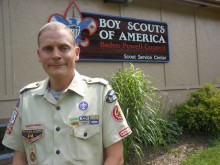Check out this cool story about Scout Executive Roger B. Hoyt, written by George Basler of the Press & Sun-Bulletin.
Roger Hoyt of Endwell joined Scouting at age 7

Tucked away on a shelf in Roger B. Hoyt’s office is the Eagle Scout certificate he earned more than 30 years ago in his hometown of Independence, Mo.
The award means a lot to the 48-year-old Endwell resident, who for the past four years has been Scout executive of the Baden-Powell Council of the Boy Scouts of America.
But the most important things on display on his office wall, Hoyt said, are the Scout Oath and the Scott Law. As Scout executive, he’s deeply conscious of the mission, embodied by the two documents, to prepare young people to make ethical and moral decisions.
“I would argue we’re more relevant that ever,” he said. “We get kids off the couch and out of doors to enjoy the world around them.”
Hoyt joined Scouting when he was 7 years old at the urging of his friends. “It immediately caught my attention because it was fun with a purpose,” he said.
Not only did he become an Eagle Scout, the highest award in Scouting, he worked for five years as a Boy Scout summer camp staffer while in high school and college.
After college and five years as a teacher and coach, he began working in a professional capacity for the Boy Scouts in various executive positions. His job before coming to New York was director of support services for the Greater Cleveland Council in Cleveland, Ohio.
“I wanted to have a positive impact on youth and the community. That’s why I got involved, and stay involved,” he said.
As Scout executive of the Baden-Powell Council, Hoyt works with a professional and support staff of 15 and summer camp staff of 100 to facilitate the work of 154 Scout units, with a youth membership of 4,062. The council, with an office in the Town of Chenango, covers six counties in the Southern Tier and northeastern Pennsylvania.
In his job, Hoyt works with his staff to support the activities of local Scouting units. That includes fundraising, training of Scout leaders, maintenance of two regional camp. planning and organizing events and insuring quality programs.
“It’s a collaborative effort,” Hoyt said. “I work with a volunteer board on what they want to do, and a professional staff on what they want to do. And I bring my own priorities.”
Over the years, he’s been influenced by a series of mentors, including his father, other Scout leaders and teachers.
One lesson he’s learned is that leaders must adapt their style to fit the people they’re working with, Hoyt said. People are individuals, and a motivational approach that works for one person may not work for another, he added.
A leader also has to be positive and encouraging, even while working toward improvement, because “people don’t respond to the negative,” Hoyt emphasized.
One of Hoyt’s priorities was to upgrade the region’s two Scout camps: Camp Barton in Trumansburg, and Tuscarora Scout Reservation in Windsor. The council developed a strategic plan, and over the past four years has pumped $700,000 into renovating the facilities.
Another priority is keeping the annual budget stable. For the past four years, the council has had a modest surplus that is being reinvested in properties and programs, he said.
While Hoyt’s been Scout executive of the Baden-Powell Council, the Boy Scouts of America has had to grapple with the issue of gay Boy Scouts. In 2013, the national organization changed its policy to one of accepting gay Scouts while keeping in place its ban on openly gay Scout leaders.
But the question of gay Scouts has not been a major issue locally, Hoyt said. One local church, Johnson City’s Primitive Methodist Church evicted a Scout troop after the policy change, but Johnson City’s All Saints Episcopal Church opened its doors to the troop.
Of more immediate concern to Hoyt is maintaining the council’s membership. The number of Scouts grew in 2012, but declined in 2013 and is down another 4 percent this year. Hoyt attributes the decline to the growing difficulty of finding adult Scout leaders and competition from other youth activities.
To get more leaders, the Boy Scouts of America is rolling out a new initiative to allow potential Cub Scout leaders to train online. Scouting also needs to adjust its programs to stay relevant, Hoyt said. The organization now offer merit badges in skills ranging from game design to programming to cinematography.
But the core mission of offering activities that emphasize character development, citizenship and physical and moral fitness remains constant, Hoyt said. “All Scouting is local,” he added. “It looks different in Endwell, Whitney Point and Montrose. But they all share common values.”
Roger B. Hoyt
Age: 48
Home: Endwell
Hometown: Independence, Mo.
Education: Graduated from William Chrisman High School in Independence, Mo., and Central Missouri State University with a bachelor’s degree in English, speech and communications
Family: Wife, Diana, a registered nurse; and a grown son
Place of employment: Scout Executive of the Baden-Powell Council of the Boy Scouts of America for four years.
Leadership philosophy: A good leader adapts his style to the people with whom he’s working.
Hobbies: Outdoor activities, animals.
About the Baden-Powell Council
- It has 4,062 youth members.
- It has 62 Eagle Scouts, including 18 in Broome.
- It runs two Scouting camps: one in Windsor; one in Trumansburg.
- It covers the Southern Tier and northeastern Pennsylvania.
- It has 63 Cub Scout packs; 63 Boy Scout troops; 12 Venture Crews; and 16 Explorer units.

